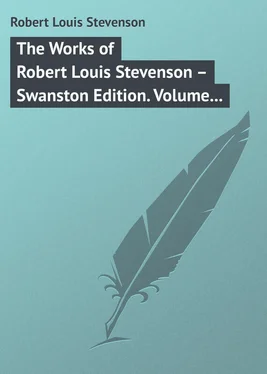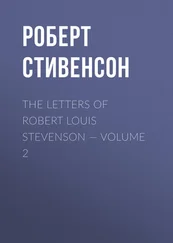Robert Stevenson - The Works of Robert Louis Stevenson – Swanston Edition. Volume 24
Здесь есть возможность читать онлайн «Robert Stevenson - The Works of Robert Louis Stevenson – Swanston Edition. Volume 24» — ознакомительный отрывок электронной книги совершенно бесплатно, а после прочтения отрывка купить полную версию. В некоторых случаях можно слушать аудио, скачать через торрент в формате fb2 и присутствует краткое содержание. Жанр: foreign_prose, на английском языке. Описание произведения, (предисловие) а так же отзывы посетителей доступны на портале библиотеки ЛибКат.
- Название:The Works of Robert Louis Stevenson – Swanston Edition. Volume 24
- Автор:
- Жанр:
- Год:неизвестен
- ISBN:нет данных
- Рейтинг книги:3 / 5. Голосов: 1
-
Избранное:Добавить в избранное
- Отзывы:
-
Ваша оценка:
- 60
- 1
- 2
- 3
- 4
- 5
The Works of Robert Louis Stevenson – Swanston Edition. Volume 24: краткое содержание, описание и аннотация
Предлагаем к чтению аннотацию, описание, краткое содержание или предисловие (зависит от того, что написал сам автор книги «The Works of Robert Louis Stevenson – Swanston Edition. Volume 24»). Если вы не нашли необходимую информацию о книге — напишите в комментариях, мы постараемся отыскать её.
The Works of Robert Louis Stevenson – Swanston Edition. Volume 24 — читать онлайн ознакомительный отрывок
Ниже представлен текст книги, разбитый по страницам. Система сохранения места последней прочитанной страницы, позволяет с удобством читать онлайн бесплатно книгу «The Works of Robert Louis Stevenson – Swanston Edition. Volume 24», без необходимости каждый раз заново искать на чём Вы остановились. Поставьте закладку, и сможете в любой момент перейти на страницу, на которой закончили чтение.
Интервал:
Закладка:
nor by looking at Mont Blanc that you find
A kind of ardour of the blood is the mother of all this; and according as this ardour is swayed by knowledge and seconded by craft, the art expression flows clear, and significance and charm, like a moon rising, are born above the barren juggle of mere symbols.
The painter must study more from nature than the man of words. By why? Because literature deals with men’s business and passions which, in the game of life, we are irresistibly obliged to study; but painting with relations of light, and colour, and significances, and form, which, from the immemorial habit of the race, we pass over with an unregardful eye. Hence this crouching upon camp-stools, and these crusts. 6 6 Croûtes : crude studies from nature.
But neither one nor other is a part of art, only preliminary studies.
I want you to help me to get people to understand that realism is a method, and only methodic in its consequences; when the realist is an artist, that is, and supposing the idealist with whom you compare him to be anything but a farceur and a dilettante . The two schools of working do, and should, lead to the choice of different subjects. But that is a consequence, not a cause. See my chaotic note, which will appear, I fancy, in November in Henley’s sheet.
Poor Ferrier, it bust me horrid. He was, after you, the oldest of my friends.
I am now very tired, and will go to bed having prelected freely. Fanny will finish.
R. L. S.To Thomas Stevenson
Some pages of MS. exist in which the writer at this time attempted to re-cast and expand a portion of the Lay Morals of 1879. A letter written some days earlier to his father, and partly quoted in Mr. Graham Balfour’s Life (ed. 1906, p. 209), explains his purpose.
La Solitude, Hyères, 12th October 1883.MY DEAR FATHER, – I have just lunched; the day is exquisite, the air comes through the open window rich with odour, and I am by no means spiritually minded. Your letter, however, was very much valued, and has been read oftener than once. What you say about yourself I was glad to hear; a little decent resignation is not only becoming a Christian, but is likely to be excellent for the health of a Stevenson. To fret and fume is undignified, suicidally foolish, and theologically unpardonable; we are here not to make, but to tread predestined, pathways; we are the foam of a wave, and to preserve a proper equanimity is not merely the first part of submission to God, but the chief of possible kindnesses to those about us. I am lecturing myself, but you also. To do our best is one part, but to wash our hands smilingly of the consequence is the next part, of any sensible virtue.
I have come, for the moment, to a pause in my moral works; for I have many irons in the fire, and I wish to finish something to bring coin before I can afford to go on with what I think doubtfully to be a duty. It is a most difficult work; a touch of the parson will drive off those I hope to influence; a touch of overstrained laxity, besides disgusting, like a grimace, may do harm. Nothing that I have ever seen yet speaks directly and efficaciously to young men; and I do hope I may find the art and wisdom to fill up a gap. The great point, as I see it, is to ask as little as possible, and meet, if it may be, every view or absence of view; and it should be, must be, easy. Honesty is the one desideratum; but think how hard a one to meet. I think all the time of Ferrier and myself; these are the pair that I address. Poor Ferrier, so much a better man than I, and such a temporal wreck. But the thing of which we must divest our minds is to look partially upon others; all is to be viewed; and the creature judged, as he must be by his Creator, not dissected through a prism of morals, but in the unrefracted ray. So seen, and in relation to the almost omnipotent surroundings, who is to distinguish between F. and such a man as Dr. Candlish, or between such a man as David Hume and such an one as Robert Burns? To compare my poor and good Walter with myself is to make me startle; he, upon all grounds above the merely expedient, was the nobler being. Yet wrecked utterly ere the full age of manhood; and the last skirmishes so well fought, so humanly useless, so pathetically brave, only the leaps of an expiring lamp. All this is a very pointed instance. It shuts the mouth. I have learned more, in some ways, from him than from any other soul I ever met; and he, strange to think, was the best gentleman, in all kinder senses, that I ever knew. – Ever your affectionate son,
Robert Louis Stevenson.To W. H. Low
The paper referred to at the beginning of the second paragraph is one on R. L. S. in the Century Magazine, the first seriously critical notice, says Mr. Low, which appeared of him in the States.
[ La Solitude, Hyères, Oct. 23, 1883.]MY DEAR LOW, — C’est d’un bon camarade ; and I am much obliged to you for your two letters and the inclosure. Times are a lityle changed with all of us since the ever memorable days of Lavenue: hallowed be his name! hallowed his old Fleury! – of which you did not see – I think – as I did – the glorious apotheosis: advanced on a Tuesday to three francs, on the Thursday to six, and on Friday swept off, holus bolus, for the proprietor’s private consumption. Well, we had the start of that proprietor. Many a good bottle came our way, and was, I think, worthily made welcome.
I am pleased that Mr. Gilder should like my literature; and I ask you particularly to thank Mr. Bunner (have I the name right?) for his notice, which was of that friendly, headlong sort that really pleases an author like what the French call a “shake-hands.” It pleased me the more coming from the States, where I have met not much recognition, save from the buccaneers, and above all from pirates who misspell my name. I saw my book advertised in a number of the Critic as the work of one R. L. Stephenson; and, I own, I boiled. It is so easy to know the name of the man whose book you have stolen; for there it is, at full length, on the title-page of your booty. But no, damn him, not he! He calls me Stephenson. These woes I only refer to by the way, as they set a higher value on the Century notice.
I am now a person with an established ill-health – a wife – a dog possessed with an evil, a Gadarene spirit – a chalet on a hill, looking out over the Mediterranean – a certain reputation – and very obscure finances. Otherwise, very much the same, I guess; and were a bottle of Fleury a thing to be obtained, capable of developing theories along with a fit spirit even as of yore. Yet I now draw near to the Middle Ages; nearly three years ago, that fatal Thirty struck; and yet the great work is not yet done – not yet even conceived. But so, as one goes on, the wood seems to thicken, the footpath to narrow, and the House Beautiful on the hill’s summit to draw further and further away. We learn, indeed, to use our means; but only to learn, along with it, the paralysing knowledge that these means are only applicable to two or three poor commonplace motives. Eight years ago, if I could have slung ink as I can now, I should have thought myself well on the road after Shakespeare; and now – I find I have only got a pair of walking-shoes and not yet begun to travel. And art is still away there on the mountain summit. But I need not continue; for, of course, this is your story just as much as it is mine; and, strange to think, it was Shakespeare’s too, and Beethoven’s, and Phidias’s. It is a blessed thing that, in this forest of art, we can pursue our woodlice and sparrows, and not catch them , with almost the same fervour of exhilaration as that with which Sophocles hunted and brought down the Mastodon.
Читать дальшеИнтервал:
Закладка:
Похожие книги на «The Works of Robert Louis Stevenson – Swanston Edition. Volume 24»
Представляем Вашему вниманию похожие книги на «The Works of Robert Louis Stevenson – Swanston Edition. Volume 24» списком для выбора. Мы отобрали схожую по названию и смыслу литературу в надежде предоставить читателям больше вариантов отыскать новые, интересные, ещё непрочитанные произведения.
Обсуждение, отзывы о книге «The Works of Robert Louis Stevenson – Swanston Edition. Volume 24» и просто собственные мнения читателей. Оставьте ваши комментарии, напишите, что Вы думаете о произведении, его смысле или главных героях. Укажите что конкретно понравилось, а что нет, и почему Вы так считаете.










